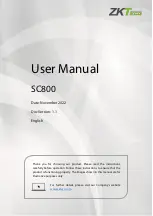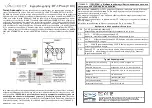Chapter 21 Serial Peripheral Interface (S12SPIV5)
MC9S12XE-Family Reference Manual , Rev. 1.19
782
Freescale Semiconductor
When all bits are clear (the default condition), the SPI module clock is divided by 2. When the selection
bits (SPR2–SPR0) are 001 and the preselection bits (SPPR2–SPPR0) are 000, the module clock divisor
becomes 4. When the selection bits are 010, the module clock divisor becomes 8, etc.
When the preselection bits are 001, the divisor determined by the selection bits is multiplied by 2. When
the preselection bits are 010, the divisor is multiplied by 3, etc. See
for baud rate calculations
for all bit conditions, based on a 25 MHz bus clock. The two sets of selects allows the clock to be divided
by a non-power of two to achieve other baud rates such as divide by 6, divide by 10, etc.
The baud rate generator is activated only when the SPI is in master mode and a serial transfer is taking
place. In the other cases, the divider is disabled to decrease I
DD
current.
NOTE
For maximum allowed baud rates, please refer to the SPI Electrical
Specification in the Electricals chapter of this data sheet.
21.4.5
Special Features
21.4.5.1
SS Output
The SS output feature automatically drives the SS pin low during transmission to select external devices
and drives it high during idle to deselect external devices. When SS output is selected, the SS output pin
is connected to the SS input pin of the external device.
The SS output is available only in master mode during normal SPI operation by asserting SSOE and
MODFEN bit as shown in
.
The mode fault feature is disabled while SS output is enabled.
NOTE
Care must be taken when using the SS output feature in a multimaster
system because the mode fault feature is not available for detecting system
errors between masters.
21.4.5.2
Bidirectional Mode (MOMI or SISO)
The bidirectional mode is selected when the SPC0 bit is set in SPI control register 2 (see
). In
this mode, the SPI uses only one serial data pin for the interface with external device(s). The MSTR bit
decides which pin to use. The MOSI pin becomes the serial data I/O (MOMI) pin for the master mode, and
the MISO pin becomes serial data I/O (SISO) pin for the slave mode. The MISO pin in master mode and
MOSI pin in slave mode are not used by the SPI.
Because
of
an
order
from
the
United
States
International
Trade
Commission,
BGA-packaged
product
lines
and
part
numbers
indicated
here
currently
are
not
available
from
Freescale
for
import
or
sale
in
the
United
States
prior
to
September
2010:
S12XE
products
in
208
MAPBGA
packages


















